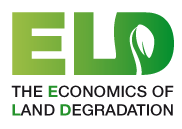The second ministerial meeting of the Interstate Commission on Sustainable Development of Central Asia (ICSD) has adopted a decision to support the Economics of Land Degradation (ELD) Initiative in Kazakhstan, Kyrgyzstan, Tajikistan, Turkmenistan and Uzbekistan.
 2 December 2014: The second ministerial meeting of the Interstate Commission on Sustainable Development of Central Asia (ICSD) has adopted a decision to support the Economics of Land Degradation (ELD) Initiative in Kazakhstan, Kyrgyzstan, Tajikistan, Turkmenistan and Uzbekistan.
2 December 2014: The second ministerial meeting of the Interstate Commission on Sustainable Development of Central Asia (ICSD) has adopted a decision to support the Economics of Land Degradation (ELD) Initiative in Kazakhstan, Kyrgyzstan, Tajikistan, Turkmenistan and Uzbekistan.
During the meeting, which convened in November 2014 in Dushanbe, Tajikistan, an ELD Initiative representative presented on ‘The Economics of Land Degradation in Central Asia: Methods and Approaches,’ which outlined primary issues related to land degradation in Central Asia, including pasture degradation, forestry and irrigated agriculture.
ICSD is expected to offer political support, co-finance events and lead national-level analysis through its scientific knowledge sharing mechanisms. Participants expressed their willingness to support the ELD Initiative and asked the Scientific-Information Committee to propose potential future collaboration between ICSD and the ELD.
Also at the meeting, countries adopted decisions aimed at reinforcing sustainable development in the region, with the UN Environment Programme (UNEP) and ICSD confirming collaboration on issues related to waste management, climate change adaptation and green economy.
Central Asian countries decided to create a waste management working group, with the objective of implementing national-level waste management projects and developing a regional perspective on waste.
ICSD and UNEP also agreed to: implement a project for mountain ecosystems to adapt to climate change, with an expert workshop meeting prior to the ministerial meeting and identifying the need for enhanced adaptation action; and work together on accelerating the transition towards green economy in the region, beginning with an assessment of existing policies and indicators, and investment needs.
During the meeting, Sylvie Motard, UNEP Regional Office for Europe, identified five priorities for the region: air pollution, water pollution, land degradation, waste management and degradation of mountain ecosystems. She said that ICSD could facilitate the green economy transition by sharing experiences and creating enabling conditions, including the establishment of an interactive database on best practices and access to technology. She mentioned that UNEP could contribute by linking to its global knowledge networks.
ICSD, which meets biannually, is the inter-governmental body of the Central Asian States to facilitate regional cooperation for the environment and sustainable development. [ELD Press Release] [UNEP Press Release]